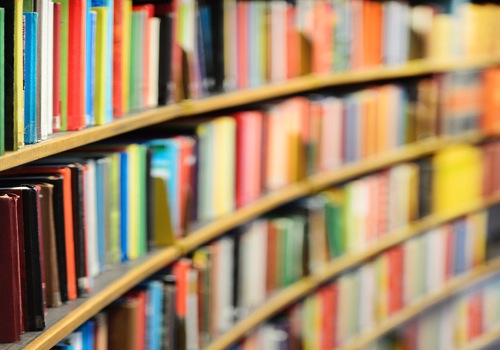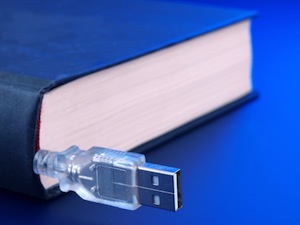 Ever since I read a New York Times article about the possibility of bedbugs spreading through library books, I’ve been too paranoid to check out a book from my local library. (Yes, I know people have argued that the article was way overblown. What can I say? I have an irrational fear of the bedbug.) So I was thrilled when I finally figured out how to borrow e-books from the library. First I requested Admission by Jean Hanff Korelitz, and it magically appeared on my iPad. Then in a frenzy of OMG-this-is-amazing, I put holds on about 15 more e-books. After finishing the first novel, I immediately downloaded the next one in my queue.
Ever since I read a New York Times article about the possibility of bedbugs spreading through library books, I’ve been too paranoid to check out a book from my local library. (Yes, I know people have argued that the article was way overblown. What can I say? I have an irrational fear of the bedbug.) So I was thrilled when I finally figured out how to borrow e-books from the library. First I requested Admission by Jean Hanff Korelitz, and it magically appeared on my iPad. Then in a frenzy of OMG-this-is-amazing, I put holds on about 15 more e-books. After finishing the first novel, I immediately downloaded the next one in my queue.
I love how easy it is to get the books, and I think I read more quickly and spend more time reading when they’re in electronic format. But my experience of processing the text does seem different. Sometimes, after I’ve finished an e-book, I don’t feel like I’ve really “read” it; it’s as if the 1s and 0s have washed through my brain without lodging anywhere. I remember reading a long, beautifully-written novel about World War II on my tablet awhile back, but I don’t recall a single thing about the plot except that it involved three brothers.
Researchers have explored differences between print and e-reading too. In a study published this year, one team found that college students who read an electronic textbook chapter on psychology took longer to read the material and spent more time dawdling on email, IM, and Facebook than students who read the chapter in print. However, the two groups didn’t perform any differently on a quiz. Other results have been mixed: Tenth-grade students in Norway scored higher on reading comprehension tests when the passage was in print, while university students in the United States scored higher on two measures of learning when they used an electronic textbook.
 For younger kids, the story itself might be more important than the format. In a 2011 study, researchers at East Carolina University tested 22 third-grade students who read The Yellow House Mystery, The Mystery Wind, and Sweet Potato Challenge. The first book was in print, and the second and third were electronic. The kids’ reading comprehension scores for the first and third books were almost the same. But their scores on the second book, which they said they didn’t like as much, were lower.
For younger kids, the story itself might be more important than the format. In a 2011 study, researchers at East Carolina University tested 22 third-grade students who read The Yellow House Mystery, The Mystery Wind, and Sweet Potato Challenge. The first book was in print, and the second and third were electronic. The kids’ reading comprehension scores for the first and third books were almost the same. But their scores on the second book, which they said they didn’t like as much, were lower.
Like most writers, I still love — and will never, ever abandon — the printed book. At my coworking space, there’s a neglected lending library that a colleague and I have been working to revive. It’s just two bookshelves across from the office kitchen, filled with hand-me-down oddities such as an ancient etiquette guide, Green Lantern comics, and a coffeetable book on tea. I can’t wait to contribute some of my own books and build a little shrine to the printed word. And eventually, I’ll make my way back to the local library too.
Image credits
First image: connel | Shutterstock
Second image: Fernando Sanchez Cortes | Shutterstock
Change is good. Embrace it! 🙂
I realize that there are advantages to e-books and I most certainly do not knock the people who prefer that format; however, my printed books do not need to be re-charged, I can read them in the bathtub and I can proudly display my library in my living room. I think I’ll still with the tactile, finger bending/cramping version of reading for the time being. BUT… whatever format people read in is a very good thing!
@Kenny – Remember, change brought us the Edsel and the Corvair.. Without suggesting that either of these things equate to e-books, might I suggest that not all change is embraceable? Now I must go, once again, and try to put my eight track tape into my Betamax player.
“ne team found that college students who read an electronic textbook chapter on psychology took longer to read the material and spent more time dawdling on email, IM, and Facebook ”
Did they try testing students who were using a dedicated reading device, like a plain Kindle without a browser? If the only objective is to see how well people learn from reading on different media, it might be useful to only test what you’re testing. People reading paper books may (or may not) be just as likely to be distracted by getting up to answer the phone, watch TV, plain daydreaming, and whathaveyou as those who can do all those things on the same device. In the days before Facebook I certainly let myself get distracted by all kinds of things.
Maggie, good question — I’m not sure what kind of reading device they used. The paper says the students “were randomly assigned to one of five formats: print textbook, printed text pages, printed manuscript in Microsoft Word, electronic pdf file, or electronic textbook”. Some students did the reading in a lab, while others did it at home; the e-reading students at home were given a CD, which seems to imply they were just reading on a computer rather than a tablet?
Kindle reader here. When someone asks me what I’ve read recently, I can’t remember! It used to be that I when read a book — a paperback I picked up or a hardcover library book — they littered my night stand or the table by the back door where we pile library books to be returned. I think looking at the covers, moving books around the house, and finding space on my bookshelves helped me remember the books I read.